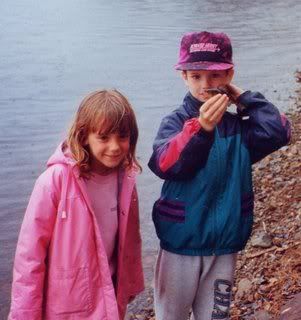
Fishing with my cousin
When thinking of my own teaching philosophy I am often reminded of the age old saying about teaching a man to fish: you can give him a fish and he'll eat for a day but teach him to fish and he'll eat for a lifetime. So often in our daily lives we get stuck on "eating for a day". The same can be said for teaching. As teachers we are supposed to supply our students with important information that they can apply to everyday life but we get caught in the trap of learning something for a closed outcome (eating for a day) such as passing a test or simply because it's in the curriculum. In our own effort to simply get through the material we skip over the "lifetime" aspect of learning while our students thirst for real world application of their new found knowledge.
It can be tricky to facilitate learning so that we are focused more on the lifetime and less on the day. However I have found that if lessons are created within the environment of inquiry while keeping in mind Gardner's theory of multiple intelligences students will be inspired to want to learn to fish. In the inquiry environment students are encouraged and supported in asking questions. Through their own thoughtful questions student will start to make personal connections and a sense of owning the knowledge can start to develop. Keeping in mind that each child is an individual with individual learning styles and processes such as Gardner suggests will help teachers create open constructivist lessons that meet the curriculum guides but also the intellectual needs of their students.
Students are individuals and a teacher should regard that information as important as the fishing pole for learning to fish. If a teacher forgets their students are all individuals with individuals needs and styles of learning they are opting to teach fishing without a pole- trapping themselves in between eating for a day and eating for a lifetime.
As a teacher if I consider all of these aspects my students will be motivated to learn because they feel encouraged and safe in asking questions; the material should resonate with them on a personal level either through their question asking or the lesson catering to their multiple intelligences. Once the students have this motivation following the constructivist theory of lesson implication should allow for the growth of problem solving skills, creative thinking and writing, and further skill development. Having followed this format through my practice teaching as well as professional experiences as an early childhood educator/ after school program coordinator I have seen firsthand how this approach can enrich a learning experience and yield these results.
I want to create a classroom where students are motivated to attend not only because I am finding new and interesting ways through their multiple intelligences to present the information but because of their own intrinsic thirst for knowledge that I hope to foster. I want students to leave my class feeling ownership in their knowledge and feeling proud to be an individual knowing their own interests have been met. This can be done not only through creative lesson planning but through classroom arrangement and the environment I create. Having various stations in a classroom is one way I have found to be conducive to the type of learning I'd like my students to achieve as well as providing students with opportunities to strengthen their multiple intelligences.
In my own learning experience I always do better on the projects and assignments for which I have more choice and the ability to include my multiple intelligences which are strongest in musical, kinsenetic, and naturalistic. Having this awareness influences how I design things for my students. Having my own learning disability also helps me understand the perspective of different students in my class and the need to engage them on their level.
I have many goals for myself as a teacher that I hope to achieve through careful observations of my students and continued professional development. Currently much of my growth has been defined by my experiences student teaching in both of my degrees, working with exceptionalities at summer programs, and running an after school program while working as an ECE. I've attended many seminars and professional development through these experiences and will continue to do so while networking with the contacts I make. Though I am instructing others on how to fish so they may eat for a lifetime; by furthering my professional development and knowledge I learn about the best types of bait and lures. I hope to continue with lifelong learning and learn from my students and peers.